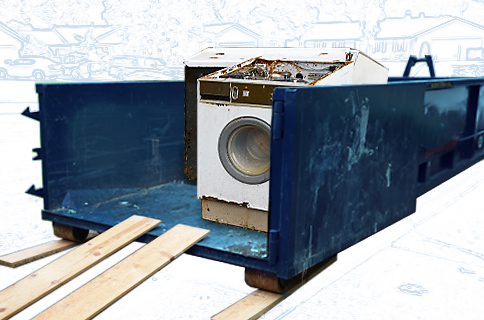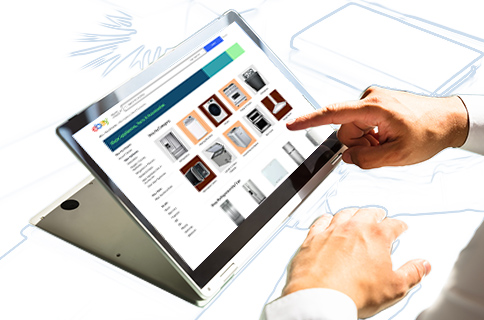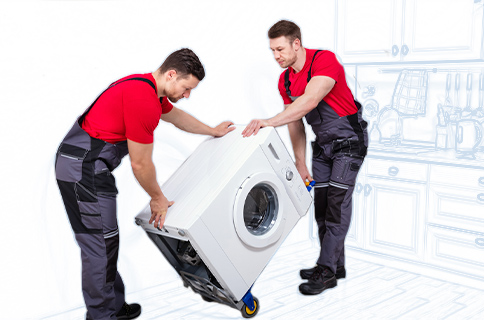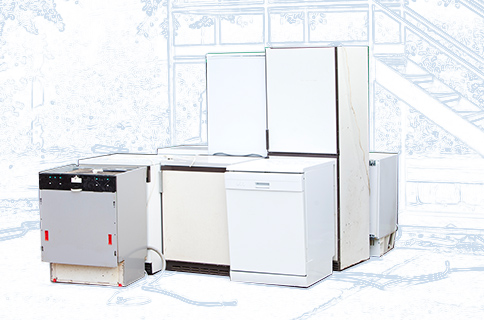
How to Dispose of Appliances

The Complete Appliance Disposal Guide
Whether your fridge is on the fritz or you are upgrading your kitchen, knowing how to dispose of appliances isn’t always an easy task. Appliances are big, bulky and made of materials that tend to make their removal difficult and costly. If you’re wondering what to do with your old appliances, check out the removal, recycling and donation options below.

Top 5 Appliance Disposal Options
1. Rent a Roll Off Dumpster
A roll off dumpster rental is an easy way to get rid of old appliances and other junk from around the house. Simply load your items into the bin and call back when you’re finished to have it all hauled away. Plus, you can hang onto your container for as long as needed to finish your project. Since you can also use a roll off dumpster to throw away other items along with your old appliances, this option is great for kitchen renovations or home cleanouts.

Benefits | Things to Consider |
|---|---|
|
|
|
|
|
|
|
2. Check With Your Local Municipal Pickup
The easiest way to get rid of an old appliance is to leave it at the curb, but you will need to check if your city offers collection and recycling services for large appliance disposal. You likely will have to schedule your appliance removal ahead of time and pay a moderate fee in addition to your usual trash bill. This option is not available everywhere, so be sure to contact your local municipal waste collection agency or department of public works for more information on the proper steps to follow.
Benefits | Things to Consider |
|---|---|
|
|
|
|
|
|
|

3. List It Online
If you have just one or two appliances to get rid of, you could list them on Craigslist or Freecycle. Locals who collect scrap metal may be willing to pick up your old appliance for free, but if you really need it out of your house, you could always offer to cover the cost of gas. This option is ideal if you have a space to keep your old appliance until it’s been claimed.
Benefits | Things to Consider |
|---|---|
|
|
|
|
|
4. Dump Them Yourself
Wondering where you can dispose of appliances so you don’t have to wait around for someone else? You can drop appliances off at most landfills or transfer stations, usually for a fee. To properly dispose of refrigerators and other cooling units you may need to have refrigerants drained prior to dumping, though most facilities will handle this step for you. Finally, for safety reasons, make sure that your items are properly strapped down in your truck before hauling them away.
Benefits | Things to Consider |
|---|---|
|
|
|
|
| |
|
Important Appliance Disposal Tip:
Some landfills may require that you remove or tape appliance doors shut prior to dumping them. This saves space by making the appliance as compact as possible. Check with your local scrapyard for more information before dropping off your old appliances.
5. Hire a Junk Removal Service
Most junk removal companies will accept old appliances for either recycling or disposal. This option is great for getting rid of one or two items. But if you’re throwing out more than that, you may want to look into other options, as their prices are determined by how much space your items take up. If you also have household clutter or renovation debris to remove, junk removal costs can add up quickly, so make sure to research junk removal options and pricing near you before enlisting their services.

Benefits | Things to Consider |
|---|---|
|
|
|
|
|

How Much Does Appliance Disposal Cost?
Trying to budget for your junk removal project? Appliance removal costs can vary greatly from location to location, but the price to get rid of old appliances is based on a few factors, including:
- How many items you’re getting rid of.
- Whether you’re replacing an old appliance with a new one.
- The kind of appliance you’re getting rid of.
We’ve broken down the costs of a few different old appliance disposal options so you can choose the right one for you.
Cost to Get Rid of Multiple Appliances
Disposal Option | Cost |
|---|---|
| |
| |
The average cost of appliance removal from a junk hauling service is $297, assuming you have less than 9 cubic yards, or 3 pickup truck loads, of used or broken appliances and other trash.
Meanwhile, the average cost of a 20 yard dumpster rental is $447, which includes more than double that amount of appliance and other junk hauling, or 6 pickup truck loads of debris.
If you’re just getting rid of just a refrigerator and a stove, a junk removal service may be your best bet. But if you also have other junk to dump, a dumpster rental is going to be the most cost-efficient old appliance disposal option for you.
Important Appliance Disposal Tip:
Junk removal companies charge by the volume of items inside their truck – the more space your items take up, the more expensive their services become. Keep this in mind if you’re throwing out more than just appliances. With a dumpster rental, you can fill the entire container for a set price, with no additional fees for the other household junk you’re throwing away.
Cost to Remove and Replace Old Appliances
If you’re removing old appliances and replacing them with new ones, many retailers can take and recycle your old appliance for you. Here are the appliance removal costs of a few popular retailers (rates may vary by location):
- Best Buy: $29.99 when a replacement appliance is purchased and delivered. Standalone pickup is $99.99.
- Lowe’s: $30 haul away fee is included with the cost of installation for a new appliance.
- The Home Depot: $25 appliance removal fee with the purchase and delivery of a new item.
- Sears: $10 per item to haul away the items you're replacing. (Prices may vary in some markets.)
Individual Appliance Disposal Costs
If you’re just getting rid of one appliance and not replacing it, the cost of removal can vary depending on the item. While it may cost nothing to throw out your old microwave with your weekly trash pickup, it could cost up to $150 for a junk removal company to take away your old chest freezer. When in doubt, call the junk service, landfill or recycling station for a quote on your individual appliance’s disposal.

Appliance Recycling Options
Wondering where to recycle appliances? These are your best options.
1. Transfer Station
If your city offers appliance recycling services, they will typically have recycling stations for large appliances at a local transfer station or dump. Most locations provide a list of accepted appliances and the price to dispose of them online, so do a quick search to learn more about options near you.

2. Local Scrap Metal Retailers
You could also try to make a little money off your old appliance by hauling it to your local scrap metal dealer. Most metal recyclers will accept appliances for sale as scrap, making this a great way to get rid of old appliances for free.
3. Retailers
Most retailers aren’t just tossing the appliances they haul away for you. If you’re in the process of replacing an appliance, do a little research on which retailers recycle appliances before making your purchase.
4. Utility Provider
Your utility provider may offer an appliance recycling program. Some organizations offer this in conjunction with the EPA’s Responsible Appliance Disposal program and may provide a free pickup or pay an incentive.
If you have trouble finding local resources for where to recycle appliances, use this guide from the EPA to locate a facility near you.

Appliance Donation Options
If your appliance doesn’t have any major problems, you can simply donate it. In fact, many charities offer appliance pickup for no charge, making this a great way to get rid of old appliances for free. Just be sure that your items can be accepted at your local charities. Some organizations, like Goodwill, generally cannot accept large or bulky appliances.
Before donating your appliance, make sure that the item:
- Is in good, working condition.
- Can be used as-is, with no repairs.
- Is clean and free of bugs or other pests.
The organizations below generally accept appliances as donations:
Donation centers that usually offer free appliance pickup:
- Salvation Army (also allows for drop-off)
- Habitat for Humanity ReStores
- St. Vincent de Paul
- Vietnam Veterans of America (small appliances only)
Donation centers that require drop-off:
- Local charities and shelters
- Goodwill (small appliances only)

Frequently Asked Questions About Appliance Disposal
Can I rent a dumpster to dispose of appliances in my area?
We accept large appliances for disposal in many of our service areas, but disposal regulations vary by location. Some cities may prohibit the disposal of ovens, refrigerators, dishwashers and other appliances in landfills. Air conditioners and refrigerators with Freon may not be accepted in some areas. One of our dumpster rental experts will let you know if there are any disposal restrictions in your area when you call.
Can I mix other items with appliances in a roll off dumpster?
Yes, you can mix most other household junk items with appliances in your dumpster, as long as they are accepted in your area. This is why a dumpster rental is ideal for disposing of appliances during a big home cleanout. There are, however, certain prohibited materials that can never be disposed of using a dumpster. Make sure to keep these items out of your container.
Are there any fees for disposing of an appliance in a dumpster?
Local landfills and transfer stations may impose additional fees for properly handling and processing large appliances. This fee applies whether the appliance is delivered directly to the landfill, left on the curb or hauled over in a dumpster.
Why do refrigerants need to be removed from freezers and refrigerators?
Refrigerators and freezers built before 1995 contain chlorofluorocarbon (CFC) refrigerants (commonly known as Freon). These substances contain ozone-depleting chemicals that destroy the ozone layer and are also powerful greenhouse gases. Improper disposal of CFCs can present a danger to the environment. Modern cooling units use ozone-friendly hydrofluorocarbon (HFC) refrigerants, but even these must be drained carefully, as they are considered greenhouse gases.
In most cases, the recycler or landfill handling your appliance disposal will drain the refrigerants themselves. But if you are responsible for draining your fridge or freezer prior to disposal, find a certified refrigerant reclaimer to do it.








